|
Tao Te Ching
THE TAOISM OF LAO TZU
|
Tao Themes The Themes of the Tao Te Ching by Lao TzuIn spite of its mere 5,000 words, the content of the Tao Te Ching is not easy to penetrate and grasp. Its minimized language and poetic form of expression open for a wide variety of interpretations. That has been evident in commentaries through the centuries, sometimes revealing pure bewilderment. Present day interpretations have not changed that.
Still, even a first reading reveals a basic pattern. The Tao Te Ching clearly focuses on a limited number of major themes or topics: The Way Virtue The Sage Non-action Moderation Ruling War Of course, some other subjects are also treated, but the whole text is mainly occupied by the above seven themes, touching any other subject briefly and within the above mentioned contexts. Those themes cover the content of the Tao Te Ching well, but what can be discussed is what chapter belongs to which theme. They often overlap. Still, the division into themes is necessary in the process of understanding what Lao Tzu has to say about the subjects he contemplates. The 81 chapters hop between them, treating them from different angles or repeating with almost the same wording what has already been stated. This becomes clear and accessible when reviewing the chapters accordingly. The seven themes are no surprise, considering the nature of Lao Tzuís philosophy.
The WayTao, the Way, is the core and essence of Taoism, and the major theme of the Tao Te Ching. It can be described as the idea of a primordial law of nature by which the universe has been given its shape and mechanics. Tao is the way the world works. This law made the world spring into being and keeps on ruling how all things in the world behave.Lao Tzu was not the first to use the term with such a splendid meaning. Since ancient times, Chinese tradition talked about Tien Tao, the Way of Heaven, referring to much the same Ė how nature was ruled. But Lao Tzu had much to say about the characteristics of this way of nature, and in what direction it leads the world as well as everything and everyone in it. Thatís what occupies a substantial number of the chapters.
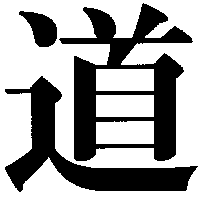 Tao, the Way. Lao Tzu hints at a primordial chaotic state, before the world emerged. Tao must have been present there, as well, or chaos would have remained forever. Whether Tao was born somehow in that chaos or just rested before springing into action at some point, Lao Tzu is unable to decide. He hesitates before the paradox of getting something out of nothing, as have so many philosophers since. But he does state clearly that the world had a beginning, although it must remain an impenetrable mystery exactly out of what the world emerged. When it did, though, it was the work of Tao. Tao created the world by bringing order to the chaos, simply by commanding it to conform to its law. From a state so disorderly that nothing could be made or perceived of it, Tao built the universe as a matter of giving it structure, taming it into a system bound by its primary natural law. In that sense, itís indeed comparable to a law of nature in modern physics like, say, gravity. It decides how the universe behaves, ever since its emergence at the Big Bang. But Tao is described as the one law ruling all others. Therefore, the best comparison would be with the idea of a united field theory, a basic law of nature behind every phenomenon in the universe. Yet, Lao Tzuís Tao is more than an impersonal natural force acting like a fixed mathematical formula. It contains meaning and purpose. It has intention and a direction, though not at all like the deity of a religion, dictating its will and relating more or less emotionally to creation. Still, Tao has an aim and clear preferences. Well, Lao Tzu is not crystal clear about this. His words can also be interpreted as suggesting the will of the Tao law of nature just being a way of looking at it: Since Tao is how nature really works, it can be described as a willful intention of this law of nature. Itís how it is, whether itís meaningful or not. Lao Tzu certainly finds it to be for the best, but he also concludes that it would be pointless and gruesome to resist it. What can be ascertained about Lao Tzuís Tao is that resistance against it is futile, whereas accepting it makes everything smoother. Thatís simply because the Tao law of nature rules everything. Again, this comes strikingly close to our understanding of the laws of nature. In several of the chapters about Tao, Lao Tzu marvels at the seeming paradox of the world being ruled by some hidden law of nature, which regulates everything without palpable means. The manifest world is run by an invisible force, a principle, which is itself untouchable, unshakable, inexhaustible. Gravity is a good illustration to Lao Tzuís impression of the Tao law of nature. Itís an invisible force commanding everything, endlessly and seemingly without any effort. A man may struggle to lift a big stone from the ground, but as soon as he lets go it falls back to the ground, bringing that effort to naught. We have learned why, at least we have it somewhat figured out, but to the ancient mind this was a mystery worth pondering. Lao Tzu enjoys the example of water, which ceaselessly moves towards the lowest point, as if exceedingly humble by nature. When the water pours downhill, it seems to be a force contained within the water itself. We know that itís gravity pulling it downwards. Lao Tzu may not have understood that, but his ideas about Tao suggest that he surmised it. Water follows Tao, which commands things to lower themselves, as if humility is the aim and the ideal of this law of nature. In that way, Tao is a law of nature acting like an ideal Ė as if the power of that law is the ideal. This is not that far from Platoís theory of ideas, regarding ideal forms as the true molds of the universe as we see it. Both Plato and Lao Tzu contemplate the same mystery: What makes things get their fixed shapes and behave according to their fixed patterns? The difference is that where Plato suggests multiple laws or conditions, Lao Tzu presumes that there is but one law, Tao, behind every condition. And this law rules the universe by the irresistible power of yielding. So, Lao Tzu teaches that we should understand Tao in order to adjust our lives accordingly. We should learn to yield to the ultimate power of yielding.
VirtueTe, Virtue, is one of the most important concepts in Tao Te Ching. Thatís why the word is also in the title. It can be explained as the noble behavior of a person who follows Tao, the Way, which is virtuous in itself. We imperfect human beings, though, have to learn it.So, Te has no value of its own. Itís not an active force in the world, but the manifestation of conforming to the one basic force Tao. What accepts Tao is therefore virtuous in a cosmic sense. What opposes Tao is not Ė and cannot last, since opposing Tao is trying to counter the way the world works. Refusing to accept Tao is as futile as jumping up and down in an effort to escape gravity. It wears you down and gets you nowhere. Using the word virtue for Te is not without risk, since itís already impregnated with meanings of European origin. Itís from the Latin virtus and is mainly know to us from its ancient Roman and later its Christian use. There is also the concept of virtý, used for what used to be called manly virtues, including firmness and leadership skills. Generally speaking, the European tradition regards virtue as moral behavior, the ability to live according to prevailing ideals. Itís regarded as something calling for discipline and self-restraint, as if human beings otherwise slip into condemnable behavior. Those are virtuous who have the strength to resist their weaknesses. Lao Tzuís Te is quite different in this respect. His virtue is one that occurs when we cease with our efforts. Itís following the natural way, wherefore we do it as soon as we let go of our ambitions Ė and only to the extent we are able to let go.
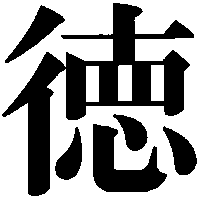 Te, virtue. So, where the European tradition has it that virtue is what makes us rise above our natural impulses and instinctual cravings, Lao Tzu is clear about regarding virtue as something lesser than the natural state itself. To him, virtue is finding our way back to the behavior we were able before our conscious minds led us astray. Virtue leads us back to a life in harmony with Tao, the original Way. The fundamental difference, then, between European and Taoist virtue is that the former regards man as a creature that should rise above nature and form a culture superior to it, while the latter teaches virtue as a method to return to nature. So, to Lao Tzu virtue is only relevant for those who deviated from the Way. Those who live according to Tao are perfectly virtuous without having to consider it. Tao is ultimate virtue, simply because it is Tao, the Way it is and should be. Especially when Lao Tzu writes ďthe greatest virtue,Ē which he does frequently, he refers to living exactly according to Tao. Someone that virtuous is very relaxed in this, needing no effort whatsoever to remain on the Way. Several of the Tao Te Ching chapters emphasize his argument for following the Way by showing what deviating from it leads to, inevitably: all kinds of misfortune and complications. That happens when virtue is abandoned or ignored, mostly because of misguided ambitions. So, whereas Tao is the ideal, Te is the manner by which to accomplish it. That seems to be Lao Tzuís major distinction between the two terms, all through the book: He speaks about Tao when describing the perfection hiding in the world, forming it and leading it right. When describing how mankind can get there, he talks about Te, the virtue we need to adopt. Te is the means by which we can live according to Tao.
The SageAccording to the Tao Te Ching, those are sage who understand the Way and act accordingly, which mostly means refraining from action. Sheng Jen, the Sage, is the ideal human being, who lives virtuously because he or she knowingly follows Tao. The Chinese expression doesnít specify gender.Lao Tzu speaks repeatedly of the sages of ancient times. He shared this view on history with most if not all Chinese thinkers of antiquity. In their eyes, the time in which they lived was far inferior to the distant past in just about every way, especially regarding the virtue of society and its inhabitants.
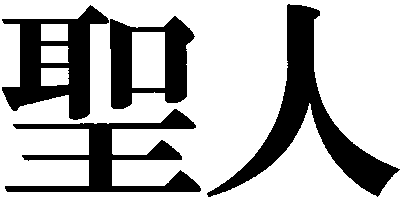 Sheng jen, the sage. This is far from a uniquely Chinese tradition. In most cultures all over the world, ancient times have been praised as superior to the present. It was the same in our Western world for most of its history. The change came with The Enlightenment of the 18th century, although vaguely at first. They still praised what they called the noble savage of the past and of distant cultures hardly touched by European progress. Actually, the concept of a kind of ignorant bliss in the minds they called primitive is not that very far from Lao Tzuís ideal of humility, innocence, and a carefree attitude towards life. A profound Western change of attitude towards the past evolved with the Industrial revolution in the 19th century. The advancement of technology and the progress of natural science soon rewrote history as one of development from a primitive state to one of increased refinement and advancement. Civilization was seen as a process of continuous improvement. Human wisdom was based on positivism, the idea that the methods of natural science are the only ones by which the world can be understood. Still, praise of the distant past has remained for outstanding feats in certain exceptional periods of history, such as the philosophy of Ancient Greece and the art of the Renaissance. To Lao Tzu, though, the view cherished by our modern world would be unfathomable. He was convinced that antiquity was better than his present in just about every conceivable way Ė certainly in regard to how the ancient ones lived according to the Way. The simple life he advocated would have no need for scientific and industrial development. Therefore, the future had nothing to add. According to Lao Tzu, the sage of the present would know to return to the ways of the sage of the past. Tao Te Ching describes the personality and behavior of the Sage in several of its chapters, hoping for every reader to follow the noble example of such wisdom.
Non-actionWu Wei, Non-action, is one of the most famous Taoist concepts, repeatedly pointed out in Tao Te Ching, the great Taoist classic. We should not hurry to act, since most things in the world take care of themselves if left alone. And when we act, we should do so cautiously, or we might destroy more than we solve.Non-action is a central pillar of Taoist behavior and understanding. The world is run perfectly by Tao, the Way, so there is very little of human initiative needed. If we try to improve things, we are most likely to damage them and make the situation worse.
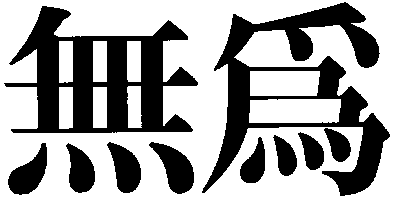 Wu wei, non-action. A Taoist waits before acting, and acts as little as possible when action is called for. Most problems go away by themselves. Lao Tzu repeats it many times, giving many different examples. Itís not so that he discourages action altogether. Sometimes we must act, but with regret and caution. Lao Tzu insists that the less we have to interfere with what happens around us, the better. To him, the ideal society is the one that accepts what fate serves. He claims that in such case, fate is gentle.
ModerationIt can come as no surprise that the attitude preferred in a world run by Tao is one of moderation. Lao Tzu, the legendary author of the text, speaks with anger about those who are unable of it. He returns again and again to the importance of modesty and moderation in all things.The word used in Tao Te Ching is jian, meaning frugality and restraint. Excess is straining on individuals and the whole society alike. Since nature ruled by Tao is a delicately tuned thing, there is no need for rocking the boat Ė neither by impulsive action nor by exaggeration.
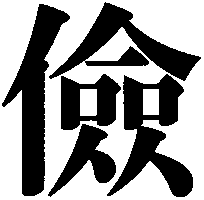 Jian, moderation. True peace of mind can only be found in harmonizing with the Way, which is one of humility and stillness. People aiming elsewhere will only hurt themselves, without finding solace in the rewards they may think they get. This ideal of moderation is shared by most philosophies and religions the world over. Worldly possessions canít satisfy the human soul, nor can the things we normally connect to social success. Lao Tzu is consistent through his book about the illusive goals of ambition and the blessing of leaving it be. That may be dull to many of us, but it is at the core of the philosophy of life presented in the Tao Te Ching.
RulingWhen the ideals are non-action and moderation, thereís not much room for ruling in a Taoist manner. But Lao Tzu doesnít deny that rulers exist and are needed. He just presents firm restrictions as to their modus operandi.A ruler should be hesitant and discreet enough to be all but invisible. A king ruling in accordance with Tao will do a lot of good Ė unnoticed, as if things took care of themselves. Well, according to Lao Tzu, mostly they do.
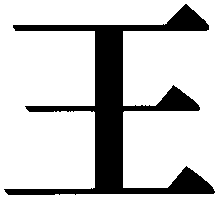 Wang, king. Although Lao Tzu is far from a ruler and just as far from wanting to be one, his text has plenty of chapters suggesting how one should act, or refrain from acting. Legend has it that he was a civil servant in the royal court of Chou. But he left in disgust, riding a water buffalo. Just before crossing the border to unknown territories, he wrote the Tao Te ching upon the request of a border guard who was impressed by his wisdom. Itís evident in the text that he was familiar with the perspective of a ruler, and speaks quite frankly about it, sometimes so frankly that he would indeed need to leave the country afterwards.
WarThe most extreme expression of ruling power is war. Itís also what opposes the principle of Tao the most, Lao Tzu states quite clearly. War is nothing but utter failure to comply with the Way.In several chapters, he points out just what a monstrosity war is and the sad state of things when itís unavoidable. Itís not unfair to regard war, in the eyes of Lao Tzu, as the very opposite of a world guided completely by Tao.
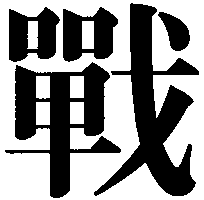 Zhan, war. Of course, itís a saddening final chord for the division into themes of Taoism to end with the condemnation of war and what induces it. The Tao Te Ching is not at all a text that ends in dismay, though not expressing that much trust in human transcendence. Its overall tone is light, not to say enlightening, in so much as it specifies what little is needed to make life on earth agreeable. Actually, the less is done, the more the world is likely to be pleasant. The reason we end in thoughts about war is simply that itís the least significant of the seven themes extracted from the Tao Te Ching. Although I donít go so far as to number the themes in importance from one to seven, I dare say that they are arranged in an adequate order. As Lao Tzu says in chapter 38:
When virtue is lost there is benevolence. When benevolence is lost there is righteousness. When righteousness is lost there are rituals. Rituals are the end of fidelity and honesty, And the beginning of confusion.
Tao Themes CategoriesHere are the categories into which the 81 chapters of the Tao Te Ching have been divided. Please observe that the Tao Theme headers, also the header for each chapter of the Tao Te Ching, are mine. Tao Te Ching gives no headers for the chapters. I've done so to facilitate the reader's navigation.
About CookiesMy Other Websites:I Ching OnlineThe 64 hexagrams of the Chinese classic I Ching and what they mean in divination. Try it online for free.
Qi Energy ExercisesThe ancient Chinese life energy qi (chi) explained, with simple instructions on how to exercise it.
Life EnergyThe many ancient and modern life force beliefs all over the world explained and compared.
Taoismen på svenska
Other Books by Stefan StenuddClick the image to see the book at Amazon (paid link).
The Greek philosophers and what they thought about cosmology, myth, and the gods. |
 Tao Te Ching
Tao Te Ching Tao Quotes
Tao Quotes Fake Lao Tzu Quotes
Fake Lao Tzu Quotes Cosmos of the Ancients
Cosmos of the Ancients Qi — Increase Your Life Energy
Qi — Increase Your Life Energy Aikido Principles
Aikido Principles Life Energy Encyclopedia
Life Energy Encyclopedia Archetypes of Mythology
Archetypes of Mythology Stefan Stenudd
Stefan Stenudd